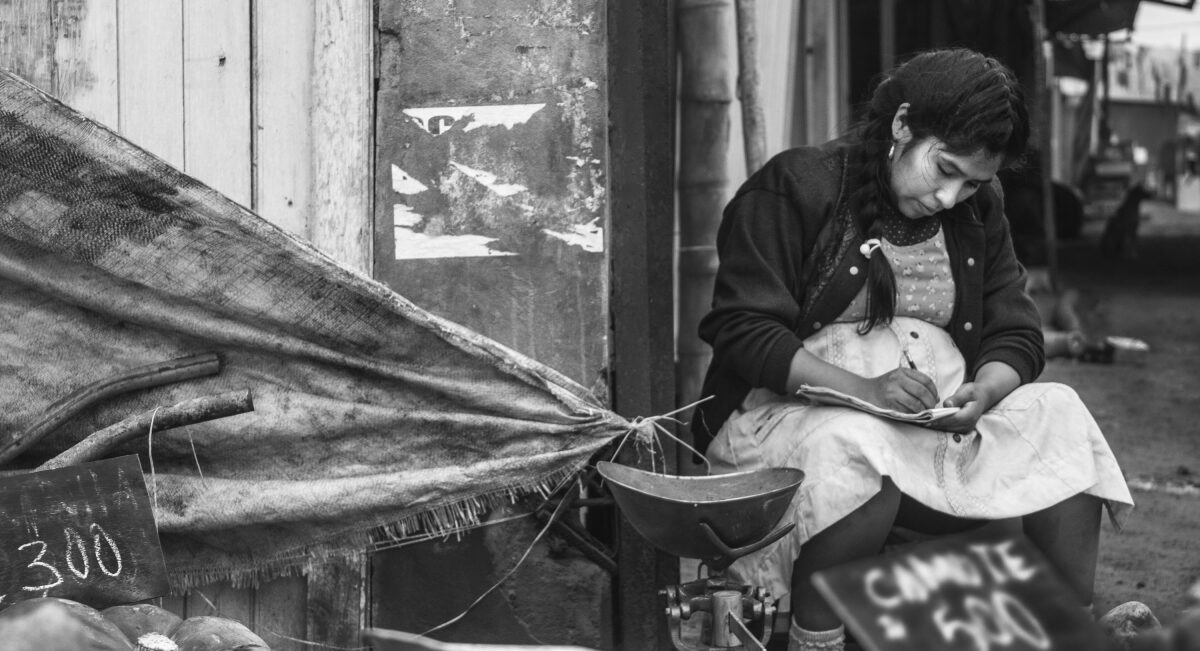
13 Aug Film Review: Canción sin Nombre / Song Without a Name
BY ROSA PARRA of LATINX LENS
EDITOR’S NOTE: THIS REVIEW CONTAINS SPOILERS —WE HIGHLY RECOMMEND YOU ENJOY THIS FILM PRIOR TO READING
In an era where many of us are asking for diversity, inclusivity, and different stories, it’s a breath of fresh air to watch “Song Without a Name” (“Canción sin Nombre”) from first-time director Melina León. León manages to deliver a beautifully shot movie depicting an Indigenous story, of a historically marginalized group that has experienced the consequences of criminal organizations, corrupt governments and colonization. It’s hard to believe this is León’s directorial debut.
“Song Without a Name” (“Canción sin Nombre”) takes place in Peru in 1988 and follows Georgina (Pamela Mendoza Arpi), an Andean Indigenous woman, as she tries to recover her newborn daughter, who was stolen soon after birth.
She lives in a small shack, with her husband, on a steep hill without roads or sidewalks. Georgina’s long-distance walks, in her advanced stage of pregnancy, to sell potatoes as their means of survival are conveyed with extremely wide shots which also demonstrate their significance in their country. Lacking basic needs, such as healthcare, she decides to visit a clinic after hearing an ad on the radio that promises free care. When she goes into labor, she heads back to the clinic by herself to deliver her baby. She lays down on a metal bed with thin padding in a room that gives off a prison-like atmosphere that’ll soon become her worst nightmare. Her daughter is born and the woman attending her informs her that the baby will be getting further exams done, and that’s the last time she sees her child. Georgina’s forced out of the clinic without any information about her baby.
The cinematography is gorgeously shot in black and white. León allows the camera to linger in certain scenes—enabling opportunity for the characters to develop the story—and allowing the audience to admire the surroundings while contemplating the difficult subject matter. The symmetrical shots are admirable and ironically tell a tragic story in a beautiful manner. “Song Without a Name” is difficult to watch, not because of its filmmaking but because of its theme. Deciding to cast a non-professional actress in the role of Georgina, was a perfect call. León stated she wanted someone who had an experience related to Georgina’s. To say that Pamela Mendoza Arpi gave a powerfully moving performance is an understatement. Her pain and desperation, supported by the sound design and score, transmitted through the screen and moved me to tears.
As a mother of four daughters, the film had a profound effect on me on a personal level. When Georgina gave birth and was kicked out of the clinic without her baby, it was gut-wrenching to watch given my own experience. I felt her pain as she walked the long distance from her house to all the different locations attempting to file a complaint. After she and her husband arrive at the palace of justice, there’s a mid-close-up shot of both of them sitting on a bench with their body language including facial expression communicating fatigue, and helplessness. I can’t begin to imagine the physical pain she must have experienced in addition to her mental and emotional exhaustion. I couldn’t tolerate the notion of having any of my daughter’s taken away from me with such injustice. I had tears in my eyes several times throughout the film. I was so deeply affected that once the film ended I hugged all four of my girls because I’m privileged to have the chance, and I’m certain it will have the same effect on many viewers.
The black and white cinematography recalls newspaper print, and the 4:3 aspect ratio resembling television broadcast is a clear indicator of the role journalism plays in this film. León’s father was a journalist and was the inspiration for this film to be produced. We’re introduced to Pedro played by Tommy Párraga in an unfortunate situation where he must report on a crime scene where children have been murdered. After Georgina is refused assistance from the government to find her baby, she goes to the newspaper building desperately seeking any help. Pedro offers to assist her and discovers a whole series of information bringing him closer to possibly finding Georgina’s daughter. Having a character to present the difficulties many journalists encounter regardless of their intent, is clever. Unfortunately, in many cases, their safety is endangered if they go further into investigating these groups and their activities, which is the case here.
The last shot of Georgina facing the sea is an efficacious depiction of a mother singing a lullaby to her unnamed child. Its impact is enhanced as the camera slowly closes up to her face, leaving the viewer questioning how many more have experienced this exact situation.
DIG EVEN DEEPER: Check out this week’s episode of Latinx Lens, a badass weekly podcast centered on just representation in film and TV that Rosa co-hosts. In this episode, Rosa and Catherine Gonzales, her co-host, discuss 4 new releases across a variety of genres—including Canción sin Nombre!

ROSA PARRA is a film reviewer who’s passionate about advocating for Latinx and female representation. She’s the co-founder and co-host of the podcast Latinx Lens, which is focused on representation and contribution of the Latinx community in Television and Film industry. She’s the assistant editor of ITOL (In Their Own League), a site and podcast dedicated to highlight women in the industry. She’s a proud member of HCA (Hollywood Critics Association), LEJA (Latino Entertainment Journalists Association), OAFFC (Online Association of Female Film Critics). She’s a coffee addict that unapologetically loves pineapple on her pizza. Stay in the loop and join the conversation—> @RosasReviews @LatinxLens

Sorry, the comment form is closed at this time.